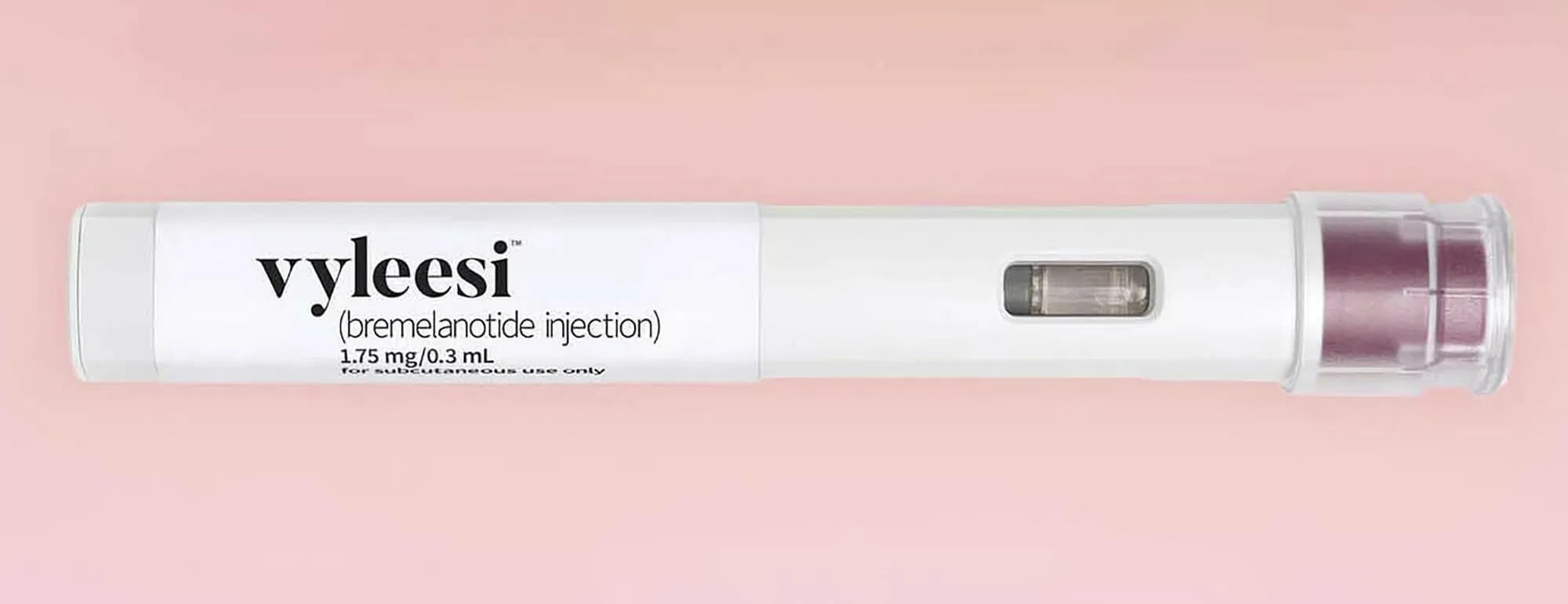
Health Info, Policy Updates
8.24.24 Voter Empowerment Alert
August 26, 2024
The FAQ-style toolkit to help you feel confident leading up to Election Day.
Consumer Health Info
Publication Date: July 12, 2019
By: NWHN Staff

Vyleesi is designed to be used on an “as-needed” basis about 45 minutes before sexual activity is expected. It has to be injected, and an auto-injector device is supplied along with the drug to make it easy to use. The drug affects hormones in the brain. (It stimulates melanocortin-4 receptors.) The melanocortin hormone is involved with social and sexual behaviors as well as other bodily functions. The mechanism of how bremelanotide influences desire is not known. Its effectiveness was evaluated by asking patients to report their feelings of desire and their level of distress related to low sex drive. It had no effect on the average number of satisfying sexual events.

Desire: Effectiveness was tested in premenopausal women in stable relationships who reported that they had low or no desire for sex for at least six months, and had no other reason for their lack of desire. 1202 women were randomized to either bremelanotide or placebo and followed for six months. The results were not impressive. According to the researchers, women randomized to bremelanotide reported an average increase of 0.3 – 0.4 points on a scale from 1 to 5. (Answers ranged from no/none at all to very high/almost always).
Distress: Subjects’ distress over lack of sexual desire modestly decreased (averages were 0.3 points lower in the bremelanotide group than the placebo group). Patient-reported answers to a single question determined these averages. The FDA’s description is that 35% of women taking bremelanotide experienced a reduction in distress of at least one point compared to 31% of women given the placebo, meaning that only 4% of women felt less distress as a result of the drug.
The company claims that results (0.3 points improvement on average, or 8% of people responding) are clinically meaningful. From the limited data available at this time, it is difficult to determine whether the women themselves felt that way. In the controlled clinical trials, nearly 40% of subjects in the bremelanotide group dropped out compared to less than 20% in the placebo group. Researchers have stated that exit surveys showed women valued the drug, but the researchers have not reported the results from the full group – only 242 women completed those surveys out of the 1202 who were part of the trial.
Common side effects include nausea (40% of people using bremelanotide), vomiting, temporary skin reddening, reactions at the injection site, and headache. Specifically due to reactions like these, 18% of subjects taking bremelanotide dropped out of the study compared to 2% of subjects taking a placebo injection. Patients shouldn’t take more than one dose in a 24-hour period, and they shouldn’t take it more than eight times in a month. This recommendation is designed to reduce the risk of high blood pressure. According to the FDA label, people who have uncontrolled hypertension or cardiovascular disease should not take this medication at all.
A small number (1%) of the phase 3 trial subjects reported skin and gum darkening, which did not fade after stopping treatment in about half of the cases. Women with darker skin experienced this symptom more often than those with lighter skin, however, both trials were conducted on a rather homogenous group (over 86% were white). Not only does that limit how generalizable the outcome results are, but it also limits our understanding of what side effects truly are “common.”
Subjects using hormonal contraceptives at the same time as bremelanotide did not show a statistically significant rise in sexual desire. Interestingly, subjects’ bodies absorbed progesterone or estrogen contraceptives sufficiently despite using bremelanotide at the same time.
According to small controlled trial taking bremelanotide at the same time as drinking alcohol doesn’t cause any ill effects (tested using the equivalent of 3 glasses of wine). This is a notable improvement over a previously approved sex-drive medication.
There’s no information about how bremelanotide affects breast milk or people who are pregnant, but no level of the drug has been deemed safe for pregnant people. Currently, there are only animal studies that suggest extremely high exposures to the drug can lead to fetal harm and developmental effects.
We know that trial participants were studied in 80 sites in the United States and Canada. Study participants were between 18 and 56 years old, female (presumably cis-gender), and were previously diagnosed with hypoactive sexual desire disorder that persisted for six months or more. They were premenopausal with no psychological, gynecological, or urological health concerns. 86% were White, 12% of the participants were Black, and only 1% identified as any other race or ethnicity. These exclusions mean that we do not know what the effect of this drug would be on women taking blood pressure medications or medications for depression or anxiety, all of which are known to reduce sexual desire in some people. Nor do we know what the experience of Latina, Indigenous or Asian women would be.
If you think you may have HSDD and wonder if your symptoms warrant intervention, the NWHN recommends considering exploring other approaches to sexual satisfaction until more safety and efficacy data are available for fully informed decision-making. However, if a person chooses to use bremelanotide, we recommend following guidelines in the FDA label.
Reviewed August 2024 by Rachel Grimsley, RN, BSN, MSN
